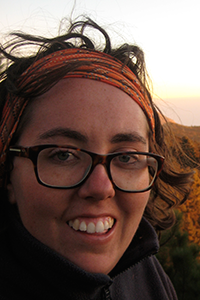
Dr Olivia Cooke
Job: Data Analyst
Employer: Civil Service
PhD Thesis: Assessment and mitigation of stormwater runoff in an informal settlement
Supervisors: Dr Lee Bryant and Dr Thomas Kjeldsen; Professor Wesaal Khan (Stellenbosch University)
One of the biggest global health problems today is that posed by urban conditions, most significantly in developing countries. Within informal settlements the lack of infrastructure including sanitation and sewage facilities can generate serious problems for health and the environment. It is necessary to understand the processes and characteristics of runoff to mitigate health risks from storm runoff and improve sanitation. The aim of this PhD is to examine how anthropogenic and environmental factors influence stormwater runoff quality and quantity during storm events in a South African settlement and improving the understanding of the links between the hydrology, geochemistry and microbiology of runoff. The case study for this research is in Enkanini, Stellenbosch one of the primary informal settlements near Cape Town, South Africa. Two fieldwork sessions in 2016 and 2017, over the summer months of May to September, were undertaken to collect data. Fieldwork included site selection based upon catchment analysis, data collection within the informal settlement and then analysis of water quality (geochemical and microbiological) and water quantity (hydrology) in the labs at Stellenbosch University. This research and work is performed in collaboration between the University of Bath and its international partner Stellenbosch University.
Olivia was a WISE CDT student from 2014-18 and undertook her PhD research at the University of Bath in the Department of Architecture and Civil Engineering. She was part of both the Water, Environment and Infrastructure Resilience (WEIR) research group and the Water Innovation and Research Centre (WIRC).
Olivia’s previous academic background was a First Class (Honours) BSc in Geography at Aberystwyth University. Her dissertation developed a risk map of malaria risk in The Gambia, and was the source of her interest in waterborne diseases and natural hazards. During her third year, Olivia studied for a term at UNIS in Svalbard in the Arctic. Her post-graduate study was a Master of Research in The Science of Natural Hazards at the University of Bristol. Fieldwork included studying the natural hazards in Guatemala, followed by research in Ecuador for her dissertation on volcano risk at Cotopaxi Volcano. The data collected during this research formed the basis of a paper published by her supervisors Dr Ryerson Christie and Dr Joachim Gottsmann (University of Bristol). On graduating from Bristol Olivia gained further experience by working on the Apolline Project, a multi-disciplinary research project in Naples, looking at volcanic deposits and four months spent as a Research Assistant at the Centre of Exchange and Research in Volcanology at the University of Colima, Mexico undertaking data collection, analysis and report writing on volcanoes in the region.
Keywords: Water quality and quantity, pathogen transport, mitigation, storm-water runoff, informal settlement





